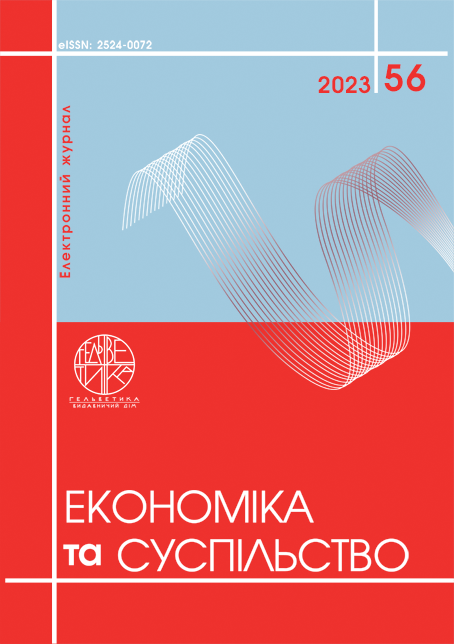REGIONAL COMPETITIVENESS UNDER THE CONDITIONS OF MARITAL STATE
Abstract
The article is devoted to the study of the competitiveness of Ukrainian regions in the conditions of war. The methodology of this study is based on the analysis of materials published in scientific periodicals, Ukrainian and foreign scientific literature. The purpose of the scientific work is to investigate the theoretical foundations of the concept of regional competitiveness, to outline the features of the region's competitiveness in the conditions of war, and to substantiate practical recommendations for its improvement. Since the problem of forming the competitiveness of the region in the conditions of martial law is quite complex, it requires further in-depth research. The article summarizes the main approaches of scientists to the interpretation of such economic categories as "region" and "competitiveness", defines the role of regions in competitive relations. Manifestations of competitiveness at the regional level, interdependence of competitiveness at different levels are studied. The key elements of the competitiveness of the region's economy are considered. The competitiveness of the region is a generalized complex indicator that characterizes the level of social and economic development of the region. It has been established that the competitiveness of the region is a complex phenomenon and precisely because of this it is difficult not only to direct regulation, but also to formalization. It has been proven that understanding the nature of competitiveness and its relationship with regional development allows for effective strategic decision-making and the formation of regional development programs. An important feature of the formation of regional competitiveness in the conditions of martial law is that all markets (labor, resources, capital) are currently undergoing a transformation process. Accordingly, marketing in the conditions of martial law became much more difficult. The main problems that directly affect the social, economic, financial, investment stability of the regions and the socio-economic security of Ukraine in the conditions of the war period are considered.
References
Boschma, R. 2004. Competitiveness of Regions from an Evolutionary Perspective, Regional Studies 38(9): 1001-1014.
Bristow, G. 2005. Everyone’s a ‘Winner’: Problematising the Discourse of Regional Competitiveness, Journal of Economic Geography 5 (3): 285 – 304.
Huggins, R., Izushi, H., & Thompson, P. 2013. Regional Competitiveness: Theories and Methodologies for Empirical Analysis, JCC, The Business and Economics Research Journal 6(2): 155-172.
Martin, R. 2003. A Study on the Factors of Regional Competitiveness. Cambridge: University of Cambridge. Retrieved from http://ec.europa.eu/regional_policy/sources/docgener/studies/pdf/3cr/competitiveness.pdf
Виклики економічного розвитку регіонів України в умовах війни та повоєнного відновлення. Науково-аналітична доповідь. URL: https://ird.gov.ua/irdp/e20230002.pdf (дата звернення: 10.10.2023).
Ліба Н. С. Конкурентоспроможність: регіональний аспект. Ринкова економіка: сучасна теорія і практика управління. Том 21. Вип. 3 (52). С.171-178.
Омельченко Т. Конкурентоспроможність українських підприємств в умовах війни. Економiка i органiзацiя управлiння. 2022. №3(47) . С.94-103.
Пугачевська К.Й., Феєр О.В. Конкурентоспроможність економіки регіону. Економіка та суспільство. 2023. №55.
Стельмах Х. П. Особливості конкурентоспроможності регіонів України. Економічний форум. 2020. №3. С.39-43.
Ступчук С.М., Лабунець В.О. Рівень конкурентоспроможності Причорноморського регіону України в умовах глобалізації та євроінтеграції світових процесів. Причорноморські економічні студії. 2018. Випуск 28-2. С. 53-57.
Черевань І.В., Бородін Б.М. Перспективні зрушення регіонального розвитку в умовах воєнних викликів. Наукові перспективи . 2023. № 1(31). С.190-199.
Boschma, R. 2004. Competitiveness of Regions from an Evolutionary Perspective, Regional Studies 38(9): 1001-1014.
Bristow, G. 2005. Everyone’s a ‘Winner’: Problematising the Discourse of Regional Competitiveness, Journal of Economic Geography 5 (3): 285 – 304.
Huggins, R., Izushi, H., & Thompson, P. 2013. Regional Competitiveness: Theories and Methodologies for Empirical Analysis, JCC, The Business and Economics Research Journal 6(2): 155-172.
Martin, R. 2003. A Study on the Factors of Regional Competitiveness. Cambridge: University of Cambridge. Retrieved from http://ec.europa.eu/regional_policy/sources/docgener/studies/pdf/3cr/competitiveness.pdf
Vyklyky ekonomichnoho rozvytku rehioniv Ukrainy v umovakh viiny ta povoiennoho vidnovlennia [Challenges of the economic development of the regions of Ukraine in the conditions of war and post-war recovery]. Naukovo-analitychna dopovid [Scientific and analytical report] https://ird.gov.ua/irdp/e20230002.pdf
Liba N. S. Konkurentospromozhnist: rehionalnyi aspekt [Competitiveness: regional aspect]. Rynkova ekonomika: suchasna teoriia i praktyka upravlinnia. Tom 21. Vyp. 3 (52). S.171-178.
Omelchenko T. Konkurentospromozhnist ukrainskykh pidpryiemstv v umovakh viiny [Competitiveness of Ukrainian enterprises in war conditions]. Ekonomika i orhanizatsiia upravlinnia. 2022. №3(47) . S.94-103.
Puhachevska K.Y., Feier O.V. Konkurentospromozhnist ekonomiky rehionu [Competitiveness of the region's economy]. Ekonomika ta suspilstvo. 2023. №55.
Stelmakh Kh. P. Osoblyvosti konkurentospromozhnosti rehioniv Ukrainy [Peculiarities of the competitiveness of the regions of Ukraine]. Ekonomichnyi forum. 2020. №3. S.39-43.
Stupchuk S.M., Labunets V.O. Riven konkurentospromozhnosti Prychornomorskoho rehionu Ukrainy v umovakh hlobalizatsii ta yevrointehratsii svitovykh protsesiv [The level of competitiveness of the Black Sea region of Ukraine in the conditions of globalization and European integration of world processes]. Prychornomorski ekonomichni studii. 2018. Vypusk 28-2. S. 53-57.
Cherevan I.V., Borodin B.M. Perspektyvni zrushennia rehionalnoho rozvytku v umovakh voiennykh vyklykiv [Prospective changes in regional development in the conditions of military challenges]. Naukovi perspektyvy . 2023. № 1(31). S.190-199.

This work is licensed under a Creative Commons Attribution 4.0 International License.


